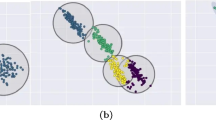Abstract
Suppose we are given a multi-dimensional dataset. For every point in the dataset, we create a transaction, or cart, in which we store the k-nearest neighbors of that point for one of the given dimensions. The resulting collection of carts can then be used to mine frequent itemsets; that is, sets of points that are frequently seen together in some dimensions. Experimentation shows that finding clusters, outliers, cluster centers, or even subspace clustering becomes easy on the cartified dataset using state-of-the-art techniques in mining interesting itemsets.
Access this chapter
Tax calculation will be finalised at checkout
Purchases are for personal use only
Similar content being viewed by others
Author information
Authors and Affiliations
Editor information
Editors and Affiliations
Rights and permissions
Copyright information
© 2012 Springer-Verlag Berlin Heidelberg
About this paper
Cite this paper
Goethals, B. (2012). Cartification: From Similarities to Itemset Frequencies. In: Domenach, F., Ignatov, D.I., Poelmans, J. (eds) Formal Concept Analysis. ICFCA 2012. Lecture Notes in Computer Science(), vol 7278. Springer, Berlin, Heidelberg. https://doi.org/10.1007/978-3-642-29892-9_4
Download citation
DOI: https://doi.org/10.1007/978-3-642-29892-9_4
Publisher Name: Springer, Berlin, Heidelberg
Print ISBN: 978-3-642-29891-2
Online ISBN: 978-3-642-29892-9
eBook Packages: Computer ScienceComputer Science (R0)




